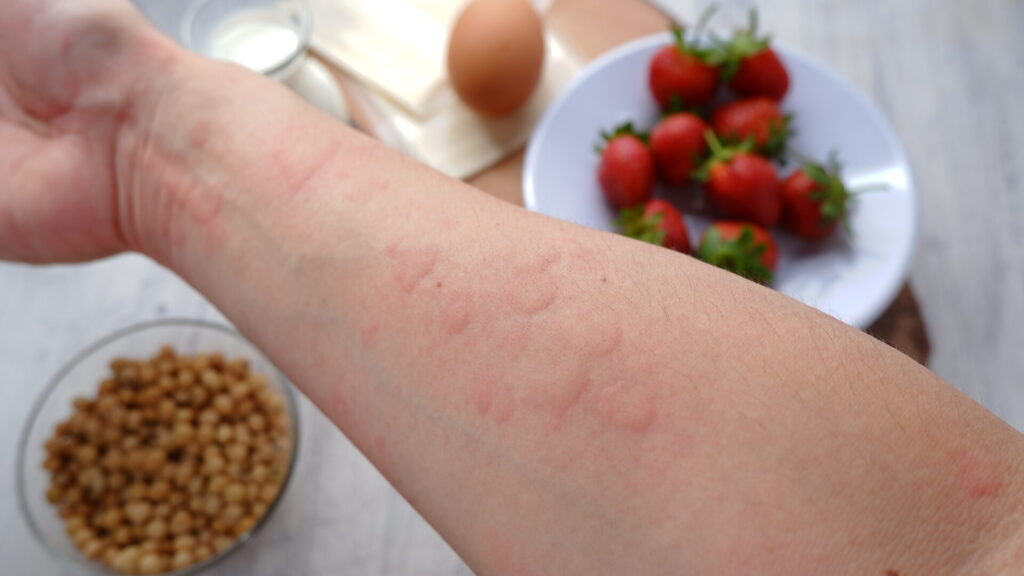Urticaria, or hives, are red, raised welts that appear on the surface of the skin. Hives can pop up anywhere on the body, but they are most common in areas of the body like:
- Back
- Chest
- Torso
- Neck
- Arms
- Legs
Patients who suffer from episodes of urticaria experience acute hives, which can last anywhere from a few minutes to a few weeks. Chronic hives, while rare, are those that persist beyond week six.
If you develop hives, it is a clue that your immune system is reacting to the presence of an allergen or irritant. In other words, you develop hives because you’re allergic to something.
Symptoms of Urticaria
Hives are typically itchy and can even sting or burn, especially after a bout of scratching.
A full list of hive symptoms include:
- Swelling
- Itching
- Raised, flat patches or “wheals” that can grow, spread, and even change shape throughout the course of a breakout
What Causes Urticaria?
Numerous substances can cause your immune system to overreact and ultimately develop hives. Before we dive into what can trigger your immune system, let’s first look at how the reaction works:
- Your immune system encounters an allergen that it sees as a threat.
- The system produces excessive amounts of chemicals, including histamine, in your bloodstream.
- As these chemicals work to ward off the substance, they also cause your body to experience side effects in the form of hives, breathing troubles, congestion, facial swelling, nausea or vomiting, and others.
- Once the irritant or allergen is out of the body and the immune system is no longer under attack, your symptoms will fade away.
Allergens are the most common cause of urticaria, but it doesn’t always develop as a response to an allergen. Sometimes, the body will release excessive amounts of histamine and cause hives to develop in response to certain events, like stress or the body overheating. The same process as steps 2-4 above occurs, but the initial trigger can vary between allergens or events.
Triggers that Can Lead to the Development of Hives
There are lots of allergens, irritants, or events that have been known to cause hives, including:
- Certain foods
- Insect bites or stings
- Latex
- Medications
- Pet dander
- Pollen
- Viral or bacterial infections from the COVID-19 virus, E. coli, and streptococcus
- Too much sun exposure
- Stress
- Tight clothing
- Overheating
- Exposure to cold weather
- Excessive sweat left on the skin

Treatment for Urticaria
Treating urticaria is sometimes as simple as ending your exposure to the irritant or allergen. For instance, if you develop a mild case of hives when you wear tight clothing, you could quickly see your hives fade after a change in outfit.
Hives that develop after eating a certain food—strawberries, for instance—can take a little longer to fade. But usually, once the food is no longer in your system, allergy symptoms like hives will disappear, which can take anywhere from a few hours to a couple of days.
Patients with mild cases of urticaria that do not require medical intervention can often treat their symptoms with over-the-counter antihistamines. Moderate urticaria may require prescription allergy medication, and patients with severe urticaria will definitely need some sort of prescription medication, which can range from oral steroids to emergency medicine like an epinephrine shot (EpiPen).
Urticaria and Anaphylaxis
Anaphylaxis is an extreme reaction to allergens where the immune system produces so many chemicals that the body cannot properly handle them. Urticaria is a common reaction among patients experiencing anaphylaxis. While the hives themselves are usually not a medical threat, additional symptoms like chest tightening and throat closing are. If you or a loved one develop hives along with swelling that narrows or blocks the airways, utilize an available EpiPen and seek medical attention immediately.
Urticaria patients can find relief from the team at Langford Allergy.
Dr. Langford and our team treat all allergies and allergy symptoms, including urticaria. Whether you experience frequent episodes of hives or develop them here and there, we can perform allergy testing to help you identify your triggers and create an individualized plan to help you avoid your triggers and treat any breakouts as soon as they occur.
Talk to our team today about your urticaria and our solutions by calling 478-787-4728.
Langford Allergy delivers allergy, asthma, and immune deficiency care to patients throughout Middle Georgia, including:
- Macon, GA
- Warner Robins, GA
- Milledgeville, GA
- Forsyth, GA
Related articles:
5 Things You Should Know About Urticaria
Symptoms of Anaphylaxis: What You Need to Know
